Nov. 27, 2024
Publications
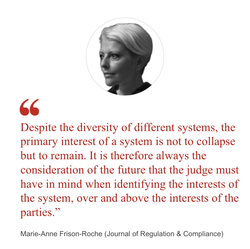
🌐follow Marie-Anne Frison-Roche on LinkedIn
🌐subscribe to the Newsletter MAFR Regulation, Compliance, Law
🌐subscribe to the Newsletter Surplomb, par MAFR
____
► Full Reference: M.-A. Frison-Roche, "Antitrust, natural field of systemic litigation"", Concurrences, November 2024, No. 4, Art. No. 120776.
____
📝read the article (in English)
____
🚧read the bilingual Working Paper which is the basis of this article, with additional developments, technical references and hyperlinks
____
► English Summary of this article: Systemic Litigation is a specific category of Litigation in which beyond the dispute between the parties the interest of a System is involved, in particular its future. Competition Law is a natural and long-standing field for this category, which is now emerging strongly for information, climate and energy systems.
It should be remembered that a market is not self-regulating and cannot continue to function in the long term unless it has the benefit of a judge, a figure who is specific in that he/she is both external to it and yet apprehends its specific interest. In order to satisfy this double requirement, liberal legal organisations often entrust the competition authority with jurisdiction over this Systemic Litigation. Ordinary courts will also hear such cases, either on appeal or in other proceedings, and it cannot be claimed that courts are excluded, the systemic dimension of the dispute being expressed by the presence of the competition authority in the proceedings. This explains the procedural rules that are hard to justify otherwise.
The Authority, the European Commission for example, must be able to develop and express the specific interests of the competition system. This special role of the competition authority in this type of litigation, because it is systemic, has been in place for decades and should serve as a model for Systemic Litigation, which is being developed for other systems whose sustainability is now referred to the courts.
________
Nov. 5, 2024
Publications

🌐follow Marie-Anne Frison-Roche on LinkedIn
🌐subscribe to the Newsletter MAFR Regulation, Compliance, Law
____
► Full Reference: M.-A. Frison-Roche, "Naissance d'une branche du Droit : le Droit de la Compliance" ("Birth of a branch of Law: Compliance Law"), in Mélanges offerts à Louis Vogel. La vie du droit, LexisNexis - Dalloz - LawLex - LGDJ, 2024, pp.177-188.
____
📝read the article (in French)
____
____
► English Summary of the article: The study focuses on the various movements that have given rise to Compliance Law, with particular emphasis on Competition Law.
After a preliminary reflection on the construction of the legal system into branches of Law, their classification in relation to each other, the difficulty encountered in this respect by Economic Law, and the various movements that give rise to one of them, the diversity of which the branch subsequently keeps track of, the study is constructed in 4 parts.
To find out what gave rise to Compliance Law, the first part invites everyone to reject the narrow perspective of a definition that is content to define it by the fact of "complying" with the applicable regulations in the sens to obey them automatically. This has the effect of increasing the effectiveness of the regulations, but it does not produce a branch of Law, being only an efficiency tool like any other.
The second part of the study aims to shed light on what appears to be an "enigma", because it is often claimed that this is the result of a flexible method through the "soft law", or of an American regulation (for instance FCPA), or of as many regulations as there are occasions to make. Instead, it appears that in the United States, in the aftermath of the 1929 crisis, it was a question of establishing an authority and rules to prevent another atrocious collapse of the system, while in Europe, in 1978, in memory of the use of files about Jews, it was a question of establishing an authority and rules to prevent an atrocious attack on human rights. A common element that aims for the future ("never again"), but not the same object of preventive rejection. This difference between the two births explains the uniqueness and diversity of the two Compliance Law, the tensions that can exist between the two, and the impossibility of obtaining a global Compliance Law.
The third part analyses the way in which Competition Law has given rise to conformity mechanisms: they had only constituted a secondary branch which is a guarantee of conformity with competition regulations. Developed in particular through the soft law issued by the competition authorities, the result is a kind of "soft obedience", a well-understood collaboration of a procedural type through which the company educates, monitors and even sanctions, without going outside Competition Law, of which compliance (in the sens of conformity) is the appendix. The distance between a conformity culture and Compliance Law can be measured here.
The fourth part aims to show that Competition Law and Compliance Law are two autonomous and articulated branches of Law. Since Compliance Law is a autonomous and strong branch of Law built around Monumental Goals, in particular the sustainability of systems and the preservation of the human beings involved so that they are not crushed by these systems but benefit from them : the current challenge of European integration is to build the pillar of Compliance Law alongside the competitive pillar. Jurisdictions are in the process of doing this and articulating them.
________

Aug. 2, 2024
Publications

🌐follow Marie-Anne Frison-Roche sur LinkedIn
🌐subscribe to the Newsletter MAFR Regulation, Compliance, Law
🌐subscribe to the Video Newsletter MAFR Surplomb
____
 ► Full Reference: M.-A. Frison-Roche, Antitrust, natural field of Systemic Litigation, Working Paper, July 2024
► Full Reference: M.-A. Frison-Roche, Antitrust, natural field of Systemic Litigation, Working Paper, July 2024
____
📝This working paper has been prepared as a basis for the article to be published "Antitrust, natural field of Systemic Litigation" in the Review Concurrences in September 2024
____
► Summary of this Working Paper: Systemic Litigation is a specific category of Litigation in which beyond the dispute between the parties the interest of a System is involved, in particular its future. Competition Law is a natural and long-standing field for this category, which is now emerging strongly for information, climate and energy systems.
It should be remembered that a market is not self-regulating and cannot continue to function in the long term unless it has the benefit of a judge, a figure who is specific in that he/she is both external to it and yet apprehends its specific interest. In order to satisfy this double requirement, liberal legal organisations often entrust the competition authority with jurisdiction over this Systemic Litigation. Ordinary courts will also hear such cases, either on appeal or in other proceedings, and it cannot be claimed that courts are excluded, the systemic dimension of the dispute being expressed by the presence of the competition authority in the proceedings. This explains the procedural rules that are hard to justify otherwise.
The Authority, the European Commission for example, must be able to develop and express the specific interests of the competition system. This special role of the competition authority in this type of litigation, because it is systemic, has been in place for decades and should serve as a model for Systemic Litigation, which is being developed for other systems whose sustainability is now referred to the courts.
____
🔓read the developments below⤵️
June 28, 2024
Thesaurus : Soft Law

► Référence complète : Autorité de la concurrence (ADLC), avis 24-A-05 du 28 juin 2024 relatif au fonctionnement concurrentiel du secteur de l’intelligence artificielle générative, juin 2024, 104 p.
____
____
📰lire le communiqué de presse accompagnant la publication de l'avis
________
May 27, 2024
Thesaurus : Soft Law
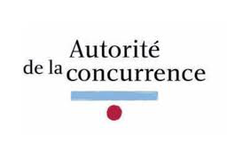
► Référence complète : Autorité de la concurrence (ADLC), Communiqué relatif aux orientations informelles de l’Autorité en matière de développement durable, 27 mai 2024, 6 p.
____
____
📰lire le communiqué de presse accompagnant la publication de ce document
________
May 24, 2024
Conferences
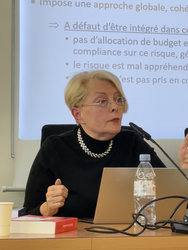
🌐follow Marie-Anne Frison-Roche on LinkedIn
🌐subscribe to the Newsletter MAFR Regulation, Compliance, Law
____
► Full Reference: M.-A. Frison-Roche, "Synthèse" ("Synthesis"), in Concurrence : les enjeux de la Compliance, May 24, 2024, Paris, Collège européen de Paris, Paris Panthéon-Assas University, 28 rue Saint-Guillaume
____
🧮see the full programme of this event (in French):
🌐read the la newsletter MAFR Law, Compliance, Regulation on 26 Mai 2024 about this colloquium and this synthesis (in English)
____
► Summary of this concluding conference:The conference was based on the 'framework document' on conformity programmes published by the French Competition Authority, the Autorité de la concurrence, on 24 May 2022 and focused on one of the tools used, namely risk mapping. The care taken to bring together academics whose job it is to give an account of reality by classifying and naming it, which makes it easier to handle, and people who every day in enterprises find solutions to anticipate difficulties so that they can be resolved, or even prevented from arising, has borne fruit.
____
From all the presentations and discussions, 4 perspectives emerge, each showing what has been achieved, what may still emerge in interaction with all the other mechanisms in Compliance Law that incorporate risk mapping (for instance ,the French 2016 so-called "Sapin 2" law, the French 2017 so-called "Vigilance" law, the CS3D European directive, etc.) and the other mechanisms that are correlated with risk mapping (audit, internal investigations, evidence likely to be raised before a judge by the enterprise and/or by a stakeholder and what remains uncertain in this 2022 framework document.
_____
The first perspective is the basis of these recommendations, encouragement, methods, advice, etc.
The second perspective is the means developed to establish and implement these compliance programmes.
The third perspective is the scope of this framework document, which also depends to a large extent on the scope of the compliance programmes adopted by the firms themselves.
The fourth perspective is that of the subjects of law who are obliged, or who benefit from the adoption of such compliance programmes in Competition Law.
____
During this conclusion, based solely on what each speaker had to say, I continued my reflections in each of these 4 directions.
This reminded me of some of my work made in English on this subject:
- M.-A. Frison-Roche (ed.), 📘Compliance Tools, ,2022
- M.-A. Frison-Roche, 🚧 Support from Compliance Law for day-to-day management of Competition Law, 2021
- M.-A. Frison-Roche, 🚧 Competition Law and Compliance Law, 2018
_________

Updated: March 15, 2024 (Initial publication: Nov. 30, 2023)
Publications

🌐follow Marie-Anne Frison-Roche on LinkedIn
🌐subscribe to the Newsletter MAFR Regulation, Compliance, Law
🌐subscribe to the Video Newsletter MAFR Surplomb
____
 ► Full Reference: M.-A. Frison-Roche, Births of a branch of Law: Compliance Law, Working Paper, November 2023.
► Full Reference: M.-A. Frison-Roche, Births of a branch of Law: Compliance Law, Working Paper, November 2023.
____
📕This Working Paper was drawn up as a basis for a contribution to the collective book given to Professor Louis Vogel, published in 2024
____
► Summary of this Working Paper: The study looks at the various movements that have given birth to Compliance Law, with particular emphasis on Competition Law.
After a preliminary reflection on the construction of the legal system into branches of Law, their classification in relation to each other, the difficulty encountered in this respect by Economic Law, and the various movements that give birth to one of them, the diversity of which the branch subsequently keeps track of, the study is constructed in 4 parts.
To find out what gave rise to Compliance Law, the first part invites us to reject the narrow perspective of a definition that is content to define it by the fact of "being conform" with all the applicable regulations. This has the effect of increasing the efficacy of the regulations, but it does not produce a branch of Law, being just a set of tools like others.
The second part of the study aims to shed some light on what appears to be an "enigma", as it is often claimed that this is the result of a soft method, or of an American political decision, or of as many regulations as there are occasions to make. Instead, it appears that in the United States, in the aftermath of the 1929 crisis, it was a decision of establishing an authority and rules to prevent another atrocious collapse of the system, while in Europe in 1978, in memory of the use of files of personal and racial information, it was a question of establishing an authority and rules to prevent an atrocious attack on human rights. A common element that aims for the future ("never again") but not the same object of preventive rejection. This difference between the two births explains the uniqueness and diversity of the two Compliance Laws, the tensions that can exist between the two, and the impossibility of obtaining a global Law.
The third part analyses the way in which Competition Law has given rise to conformity: a secondary branch which is a guarantee of conformity with competition rules. Developed in particular through the soft law issued by the competition authorities, the result is a kind of soft obedience, a well-understood collaboration of the procedural type through which the firm educates, monitors and even sanctions, without leaving the cercle of Competition Law, of which conformity is an appendix. The distance between a culture of conformity and the substantial Compliance Law can be measured here.
The fourth part aims to show that Competition Law and Compliance Law are two autonomous and articulated branches of Law. Since Compliance Law is a branch of Law built on Monumental Goals, in particular the sustainability of systems and the preservation of the human beings involved so that they are not crushed by them but benefit from them, the current challenge of European integration is to build the pillar of Compliance Law alongside the competitive pillar. Jurisdictions are in the process of doing this and of linking the two.
____
🔓read the Working Paper below⤵️
Feb. 15, 2024
Thesaurus : Doctrine
► Référence complète : C. Prieto, "Les autorités administratives indépendantes et les sources du droit des affaires : l’exemple de l’Autorité de la concurrence", JCP E, n° 7-8, 15 février 2024, étude 1050, pp. 24-34
____
► Résumé de l'article (fait par l'auteure) : "Les autorités administratives indépendantes ont-elles leur place dans les sources du droit des affaires ? À partir de l’exemple de l’Autorité de la concurrence, une réponse est apportée à la lumière des avancées du Conseil d’État et de la Cour de cassation.".
____
🦉Cet article est accessible en texte intégral pour les personnes inscrites aux enseignements de la Professeure Marie-Anne Frison-Roche
________
Feb. 6, 2024
Thesaurus : 10. Autorité de la Concurrence
► Référence complète : Autorité de la concurrence (ADLC), décision n° 24-D-02 du 6 février 2024 relative à des pratiques mises en œuvre dans le secteur de la distribution de chocolats
____
________
Dec. 11, 2023
Thesaurus : 10. Autorité de la Concurrence
► Référence complète : Autorité de la concurrence (ADLC), décision n° 23-D-12 du 11 décembre 2023 relative à des pratiques mises en œuvre dans le secteur des thés de luxe
____
________
Feb. 10, 2023
Thesaurus : 01. Conseil constitutionnel
► Full reference: Conseil constitutionnel (French Constitutional Council), decision n°2022-1035, QPC, 10 February 2023, Société Sony interactive entertainment France et autre
____
► Read the decision (in French)
________
Feb. 1, 2023
Compliance: at the moment

♾️ suivre Marie-Anne Frison-Roche sur LinkedIn
♾️ s'abonner à la Newsletter MAFR Regulation, Compliance, Law
____
► Référence complète : M.-A. Frison-Roche, "Face à des professions régulées, l'Autorité de la concurrence se comporte en Régulateur", Newsletter MAFR Law, Compliance, Regulation, 1ier février 2023.
____
L'Autorité de la concurrence publie le 1ier février 2023 deux consultations publiques jumelées, relatives à la Liberté d'installation des notaires et des commissaires de justice.
Chacun a jusqu'au 22 mars 2023 pour y contribuer.
Ce faisant, l'Autorité se place dans une perspective de régulation car elle articule l'usage de ce pouvoir général de consultation - préalable à un avis à propos de l'installation de nouvelles études, en s'appuyant notamment sur les contributions, avec un pouvoir spécifique et direct que lui a donné la Loi : celui de superviser la carte de ces nouvelles ouvertures.
S'il ne s'agissait d'exercer ce dernier pouvoir que dans la perspective concurrentielle, il ne serait pas pertinent d'articuler cela à un avis et une consultation globale sur la politique générale du maillage territorial par lequel notaires et commissaires de justice exercent leurs activités.
La perspective de régulation, qui embrasse davantage et établit des équilibres à long terme entre la concurrence et d'autres soucis, est affirmée par l'Autorité de concurrence.
Cette perspective adoptée par l'Autorité est légitime, dès l'instant que la loi le lui permet, lui offrant tous les instruments pour le faire, et que les entreprises et/ou les activités dont il s'agit sont elles-mêmes régulées. C'est le cas lorsque les entreprises appartiennent à ce que l'on appelle souvent des "professions réglementées", la réglementation étant l'indice le plus certain de la régulation Ex Ante.
C'est même reconnaître leur nature que de le faire, ne pas les briser en ne leur appliquant que la pure et simple "loi de la concurrence".
Le Législateur permet à l'Autorité de le faire puisque, comme elle le rappelle dans son Communiqué, la loi dite Macron de 2015 lui a donné mission de contrôler le maillage d'ouverture sur le territoire concernant les notaires et ceux qui sont aujourd'hui les commissaires de justice. C'est l'Autorité qui formule les propositions d'ouverture, la carte devant être revue tous les 2 ans.
L'on avait à l'époque beaucoup considéré que la seule perspective était celle de la concurrence, qu'il ne s'agissait que de laisser le mécanisme concurrence entrer dans ces activités, quoi qu'il en résulte et que l'Autorité allait être chargée de cela, alors que le texte présentait déjà une perspective de régulation.
🔴 M.-A. Frison-Roche, 📝Notariat et Régulation font bon ménage, 2015
L'Autorité accroît cette perspective de régulation, c'est-à-dire de construction et de maintien d'équilibres à long terme, rappelant la pratique qu'elle a eue, qu'elle qualifie de "prudente", intégrant notamment les difficultés de la crise sanitaire et le souci du long terme.
Par le biais des consultations pour former des recommandations adéquates, parce que la consultation est un pouvoir général, celle-ci peut dépasser l'objet plutôt restrictif de la loi qui se soucie de l'équilibre territorial. Qu'on en juge, puisque les contributeurs sont invités à réfléchir dans la perspective suivante: "Outre les thèmes récurrents des consultations publiques (l’évaluation de la procédure de nomination, l’impact des créations d’offices sur les différentes parties prenantes ou la cohésion territoriale des prestations), l’Autorité a identifié plusieurs enjeux importants sur lesquels les acteurs intéressés sont invités à formuler des observations, dont notamment :
- les conséquences de la crise sanitaire sur le volume d’activité et l’organisation des offices ;
- les risques pesant sur l’activité des professionnels du fait de la dégradation de la conjoncture économique (ralentissement de la croissance, hausse de l’inflation, durcissement des conditions d’octroi de crédits immobiliers,…) ;
- l’impact de la réforme de la discipline et de la déontologie des professions du droit ;
- les implications de la fusion des professions d'huissier de justice et de commissaire-priseur judiciaire en une profession unique de commissaire de justice depuis juillet 2022".
Ainsi, plutôt que de ne regarder que l'aspect concurrentiel dans ce qui n'est qu'une recommandation, laissant au Gouvernement le soin d'intégrer le reste dans ses propres décisions, notamment parce qu'il mène par ailleurs ses réformes (fusion des professions, réformes de la discipline et déontologie), l'Autorité intègre l'ensemble dès son intervention.
Le président de l'Autorité, Benoît Cœuré, a d'ailleurs développé cette conception lors du premier colloque des Commissaires de justice le 8 décembre 2022.
L'Autorité a raison de le faire, car on connait le poids de ses "recommandations" dont l'encre est déjà le plus souvent celle des arrêtés ministériels en fin de process.
En ouvrant à chacun la possibilité d'exprimer sa conception sur ce qui doit être un maillage territorial adéquat, et au-delà un déploiement adéquat de ces professions, l'Autorité de la concurrence participe plus directement à la régulation de ces professions, qui sont des entreprises dont la mission spécifique implique à la fois des obligations (la discipline et la déontologie, par exemple), une supervision et des règles plus complexes que la libre rencontre de l'offre et de la demande.
Si une Autorité de concurrence n'est pas légitime à se transformer en Autorité de régulation concernant des activités économiques qui sont ordinaires, car la régulation, notamment en ce qu'elle est ex ante et implique des mécanismes de compliance sur les entreprises concernées, en revanche si les entreprises, ici les officiers publics ou les professions libérales, comme les avocats, les médecins ou les pharmaciens, sont elles-mêmes régulées, l'Autorité de concurrence reconnaît leur nature en s'associant à la supervision exercée par les Autorités publiques (dans le cas présent, par le Ministère de la justice).
En outre et en cela, l'Autorité de concurrence s'articule avec les structures professionnelles que sont les Ordres, à travers la notion de "mission".
🔴 M.-A. Frison-Roche, 🎤La compliance dans l'entreprise notariale : aspects théoriques et pratiques, 2022
🔴 M.-A. Frison-Roche, 🎥La compliance, perspective dynamique pour exprimer la raison d'être des commissaires de justice, 2022
🔴 M.-A. Frison-Roche, 🎥Régulation et Compliance, expression des missions d'un Ordre, 2022
________
Feb. 1, 2023
Thesaurus : 02. Cour de cassation
► Référence complète : Com., 1er février 2023, n° 20-21.844 (publié au Bulletin).
____
____
Texte intégral
AU NOM DU PEUPLE FRANCAIS
COMM.
FB
COUR DE CASSATION
______________________
Audience publique du 1er février 2023
Rejet
M. VIGNEAU, président
Arrêt n° 94 FS-B
Pourvoi n° H 20-21.844
R É P U B L I Q U E F R A N Ç A I S E
_________________________
AU NOM DU PEUPLE FRANÇAIS
_________________________
ARRÊT DE LA COUR DE CASSATION, CHAMBRE COMMERCIALE, FINANCIÈRE ET ÉCONOMIQUE, DU 1ER FÉVRIER 2023
L'ordre des architectes, dont le siège est [Adresse 4], domicilié en cette qualité au Conseil national de l'ordre des architectes, a formé le pourvoi n° H 20-21.844 contre l'arrêt rendu le 15 octobre 2020 par la cour d'appel de Paris (pôle 5, chambre 7), dans le litige l'opposant :
1°/ à l'Autorité de la concurrence, dont le siège est [Adresse 1], représentée par sa présidente, en exercice, domiciliée audit siège,
2°/ à M. [Z] [B], domicilié [Adresse 3],
3°/ au ministre de l'économie, des finances et de la relance, domicilié [Adresse 2], représentant la direction générale de la concurrence, de la consommation et la répression des fraudes,
défendeurs à la cassation.
Le demandeur invoque, à l'appui de son pourvoi, les trois moyens de cassation annexés au présent arrêt.
Le dossier a été communiqué au procureur général.
Sur le rapport de Mme Michel-Amsellem, conseiller, les observations de la SARL Matuchansky, Poupot et Valdelièvre, avocat de l'ordre des architectes, de la SCP Duhamel-Rameix-Gury-Maitre, avocat de l'Autorité de la concurrence, représentée par sa présidente, et l'avis de M. Douvreleur, avocat général, à la suite duquel le président a demandé aux avocats s'ils souhaitaient présenter des observations complémentaires, après débats en l'audience publique du 6 décembre 2022 où étaient présents M. Vigneau, président, Mme Michel-Amsellem, conseiller rapporteur, Mme Darbois, conseiller doyen, Mmes Poillot-Peruzzetto, Champalaune, conseillers, Mmes Comte, Bessaud, Bellino, M. Regis, conseillers référendaires, M. Douvreleur, avocat général, et Mme Labat, greffier de chambre,
la chambre commerciale, financière et économique de la Cour de cassation, composée, en application de l'article R. 431-5 du code de l'organisation judiciaire, des président et conseillers précités, après en avoir délibéré conformément à la loi, a rendu le présent arrêt ;
Faits et procédure
1. Selon l'arrêt attaqué (Paris, 15 octobre 2020), par une décision n° 19-D-19 du 30 septembre 2019, l'Autorité de la concurrence, qui s'était saisie d'office de pratiques mises en oeuvre dans le secteur d'activité des architectes, a sanctionné, sur le fondement des articles L. 420-1 du code de commerce et 101 du Traité sur le fonctionnement de l'Union européenne (TFUE), l'ordre des architectes, six sociétés d'architectes et quatre architectes pour avoir mis en oeuvre des décisions d'association d'entreprises constitutives d'ententes anticoncurrentielles. Ces décisions consistaient, pour la première, à diffuser et à imposer une méthode de calcul d'honoraires à l'ensemble des architectes de plusieurs régions, la seconde, à diffuser un modèle de saisine de la chambre de discipline en cas d'allégation de concurrence déloyale contre les architectes pratiquant des prix bas, ces saisines ayant vocation à être déposées et défendues par les conseils régionaux de l'ordre (CROA).
Examen des moyens
Sur le troisième moyen
2. En application de l'article 1014, alinéa 2, du code de procédure civile, il n'y a pas lieu de statuer par une décision spécialement motivée sur ce moyen qui n'est manifestement pas de nature à entraîner la cassation.
Sur le premier moyen
Enoncé du moyen
3. L'ordre des architectes fait grief à l'arrêt de n'annuler la décision n° 19-D-19 du 30 septembre 2019 de l'Autorité de la concurrence relative à des pratiques mises en oeuvre dans le secteur des prestations d'architecte qu'en ce qu'elle lui a infligé une sanction pécuniaire de 1 500 000 euros, de prononcer une sanction pécuniaire de 1 500 000 euros contre lui au titre des pratiques visées aux articles 1 à 5 de la décision et de rejeter pour le surplus ses autres moyens en annulation et réformation, alors :
« 1°/ qu'en vertu du principe de séparation des autorités administratives et judiciaires, le juge administratif est seul compétent pour se prononcer sur la conformité au droit de la concurrence d'actes ou de pratiques résultant de l'exercice de prérogatives de puissance publique, y compris lorsqu'un tel exercice apparaît manifestement inapproprié ; qu'en retenant, au contraire, pour justifier la compétence de l'Autorité de la concurrence, que celle-ci pouvait connaître, notamment, des pratiques relevant de l'exercice de prérogatives de puissance publique lorsqu'elles ont été mises en oeuvre de manière manifestement inappropriée et, par conséquent, détachable de la mission de service public, la cour d'appel a violé la loi des 16-24 août 1790 et le décret du 16 fructidor an III, ensemble les articles L. 410-1 et L. 464-8 du code de commerce ;
2°/ qu'à supposer que l'usage manifestement inapproprié de prérogatives de puissance publique puisse conférer à l'Autorité de la concurrence une compétence résiduelle pour apprécier si cet usage est constitutif de pratiques anticoncurrentielles, aucun des faits reprochés en l'espèce à l'ordre des architectes ne relève d'un usage de ses prérogatives de puissance publique qui, avec l'évidence requise, peut être qualifié de manifestement inapproprié, de sorte que l'appréciation des pratiques en cause pourrait échapper à la compétence de principe du juge administratif ; qu'en retenant le contraire, la cour d'appel a violé la loi des 16-24 août 1790 et le décret du 16 fructidor an III, ensemble les articles L. 410-1 et L. 464-8 du code de commerce ;
3°/ que le caractère manifestement inapproprié de l'usage de prérogatives de puissance publique ne saurait se déduire de la seule constatation du caractère anticoncurrentiel des pratiques reprochées ; qu'en l'espèce, pour estimer que l'Autorité de la concurrence avait, à juste titre, retenu sa compétence, la cour d'appel s'est bornée à relever, d'une part, que la procédure avait pour objet de déterminer si l'ordre des architectes avait mis en oeuvre des pratiques qui, sous couvert d'usage de son pouvoir disciplinaire, tendaient à unifier et à contrôler les prix pratiqués par ses membres, d'autre part, que de telles pratiques constituaient un usage manifestement inapproprié des prérogatives de puissance publique confiées à l'ordre des architectes ; qu'en se prononçant de la sorte, par un motif général impropre à établir le caractère manifestement inapproprié de l'exercice de ses prérogatives de puissance publique par l'ordre des architectes, la cour d'appel a privé sa décision de base légale au regard du principe de séparation des autorités administratives et judiciaires, ensemble les articles L. 410-1 et L. 464-8 du code de commerce. »
Réponse de la Cour
4. L'article 106, § 2, du Traité sur le fonctionnement de l'Union européenne (TFUE) dispose :
« Les entreprises chargées de la gestion de services d'intérêt économique général (...) sont soumises aux règles (...) de concurrence, dans les limites où l'application de ces règles ne fait pas échec à l'accomplissement en droit ou en fait de la mission particulière qui leur a été impartie ».
5. Selon la jurisprudence de la Cour de justice de l'Union européenne, si une activité, qui, par sa nature, les règles auxquelles elle est soumise et son objet, est étrangère à la sphère des échanges économiques ou se rattache à l'exercice de prérogatives de puissance publique, échappe à l'application des règles de concurrence du Traité, lorsqu'une organisation comme un ordre professionnel n'exerce pas de prérogatives typiques de puissance publique, elle apparaît comme l'organe de régulation d'une profession dont l'exercice constitue, par ailleurs, une activité économique entrant dans le champ d'application du TFUE (CJUE, 19 février 2002, Wouters e.a., C-309/99, §§ 57 et 58).
6. L'article L. 410-1 du code de commerce dispose :
« Les règles définies au présent livre s'appliquent à toutes les activités de production, de distribution et de services, y compris celles qui sont le fait de personnes publiques, notamment dans le cadre de conventions de délégation de service public. »
7. Par une décision du 18 octobre 1999 (Tribunal des conflits, 18 octobre 1999, Bull. 1999, T. conflits, n° 29), le Tribunal des conflits a retenu que, « si dans la mesure où elles effectuent des activités de production, de distribution ou de services les personnes publiques peuvent être sanctionnées par le Conseil de la Concurrence agissant sous le contrôle de l'autorité judiciaire, les décisions par lesquelles ces personnes assurent la mission de service public qui leur incombe au moyen de prérogatives de puissance publique, relèvent de la compétence de la juridiction administrative pour en apprécier la légalité et, le cas échéant, pour statuer sur la mise en jeu de la responsabilité encourue par ces personnes publiques. »
8. Il s'ensuit que les personnes publiques qui effectuent des activités de production, de distribution ou de services peuvent être sanctionnées par l'Autorité de la concurrence, sous le contrôle de la cour d'appel de Paris, sauf lorsque les pratiques s'inscrivent dans l'accomplissement de la mission de service public et/ou mettent en oeuvre des prérogatives de puissance publique pour effectuer les activités en cause.
9. Par une décision du 4 mai 2009 (Tribunal des conflits, 4 mai 2009, Bull. 2009, T. conflits, n° 12), ce même Tribunal a jugé que si les règles définies au livre IV du code de commerce relatif à la liberté des prix et à la concurrence s'appliquent à toutes les activités de production, de distribution et de services, y compris celles qui sont le fait de personnes publiques, notamment dans le cadre de conventions de délégation de service public, l'Autorité de la concurrence n'est pas, pour autant, compétente pour sanctionner la méconnaissance des règles prohibant les pratiques anticoncurrentielles en ce qui concerne les décisions ou actes portant sur l'organisation du service public ou mettant en oeuvre des prérogatives de puissance publique. Il a ensuite retenu que la pratique imputée au Centre des monuments nationaux, établissement public administratif qui exerce une activité de production, de distribution et de services, et consistant, au profit de son propre centre éditorial, à réduire, voire supprimer, les commandes et, partant, les ventes des ouvrages édités et diffusés par la société Jean-Paul Gisserot, objet d'un marché public liant les parties, et susceptible de constituer une pratique anticoncurrentielle, étrangère à l'organisation du service public géré par l'établissement public, ne constitue pas la mise en oeuvre de prérogatives de puissance publique.
10. Il en résulte que si les décisions par lesquelles les personnes publiques ou les personnes privées chargées d'un service public exercent la mission qui leur est confiée et mettent en oeuvre des prérogatives de puissance publique et qui peuvent constituer des actes de production, de distribution ou de services au sens de l'article L. 410-1 du code de commerce, entrant dans son champ d'application, ne relèvent pas de la compétence de l'Autorité de la concurrence, il en est autrement lorsque ces organismes interviennent par leur décision hors de cette mission ou ne mettent en oeuvre aucune prérogative de puissance publique.
11. Après avoir relevé que les pratiques reprochées à l'ordre des architectes d'avoir, d'une part, diffusé et imposé une méthode de calcul d'honoraires à l'ensemble des architectes de plusieurs régions via ses CROA, d'autre part, diffusé, au plan national, un modèle de saisine de la chambre de discipline en cas d'allégation de concurrence déloyale fondée sur le niveau, jugé trop faible, des honoraires pratiqués par un architecte, interviennent dans un secteur, celui des prestations d'architecte, régi par le principe de liberté des prix et dans un cadre, celui des marchés publics, soumis aux règles de la libre concurrence, l'arrêt retient que la procédure a eu pour objet de déterminer si et dans quelle mesure l'ordre des architectes avait concouru à la diffusion de tarifs et de méthodes de calcul des prix et mis en place un système de contrôle des prix généralisé, par des mesures de contrainte et menaces de procédures disciplinaires ayant pour finalité d'encadrer tant l'offre que la demande en matière de maîtrise d'ouvrage pour la construction d'ouvrages publics dans le sens de consignes tarifaires.
12. De ces énonciations, constatations et appréciations, faisant ressortir que les pratiques en cause ne relevaient pas de la mission de service public confiée à l'ordre des architectes ni des prérogatives de puissance publique qui lui étaient conférées pour cette mission, la cour d'appel, abstraction faite du motif erroné, critiqué par la première branche du moyen, a exactement déduit que l'Autorité de la concurrence était compétente pour les poursuivre et les sanctionner.
13. Le moyen n'est donc pas fondé.
Sur le deuxième moyen
Enoncé du moyen
14. L'ordre des architectes fait le même grief à l'arrêt, alors :
« 1°/ que le CNOA et les CROA, qui disposent de tous les attributs de la personnalité juridique, sont dotés chacun, individuellement et indépendamment de l'ordre des architectes, de la personnalité juridique ; qu'en retenant que seul l'ordre des architectes disposait de la personnalité morale pour en déduire que l'Autorité de la concurrence avait pu légalement imputer les pratiques litigieuses à l'ordre des architectes lui-même, la cour d'appel a violé les articles 26 de la loi n° 77-2 du 3 janvier 1977, 36 et 37 du décret n° 77-1481 du 28 décembre 1977, ensemble les articles L. 420-1 et L. 464-2 du code de commerce et 101 du Traité sur le fonctionnement de l'Union européenne (TFUE) ;
2°/ que les infractions au droit de la concurrence doivent être imputées à l'entité juridique responsable au sens du droit de la concurrence et susceptible de se voir infliger une sanction ; que la cour d'appel s'est bornée, en l'espèce, à relever que l'ordre des architectes avait la personnalité morale et que le CNOA et les CROA n'en étaient que des démembrements pour imputer à l'ordre des architectes lui-même les pratiques litigeuses, dont il n'est pourtant pas contesté qu'elles auraient été matériellement mises en oeuvre respectivement par le CNOA et par chacun des quatre CROA en cause ; qu'en se prononçant de la sorte, par des motifs impropres à justifier en quoi le CNOA et les CROA en cause ne pouvaient être tenus pour responsables des pratiques litigieuses au sens du droit de la concurrence ni comme étant aptes à se voir infliger une sanction, la cour d'appel a privé sa décision de base légale au regard des articles L. 420-1 et L. 464-2 du code de commerce et 101 du TFUE ;
3°/ que si l'Autorité de la concurrence peut choisir de ne poursuivre que certaines des différentes personnes responsables d'une même infraction, il résulte du principe de responsabilité personnelle, qu'elle ne peut imputer de griefs qu'à une entité qui en est responsable, au sens du droit de la concurrence, sans marge d'appréciation ; qu'en retenant, au contraire, que l'Autorité de la concurrence disposait d'une marge d'appréciation qui lui permettait en l'espèce de choisir, en opportunité, qui de l'ordre des architectes ou du CNOA et des CROA mis en cause elle souhaitait poursuivre pour les pratiques prétendument mises en oeuvre par ces derniers, la cour d'appel a violé les articles L. 420-1 et L. 464-2 du code de commerce et 101 du TFUE ;
4°/ qu'en relevant que l'Autorité de la concurrence pouvait choisir la personne morale qu'elle entendait poursuivre et qu'elle avait pu, en l'espèce, choisir d'imputer les faits au seul ordre des architectes, la cour d'appel a, implicitement mais nécessairement, admis que le CNOA et les CROA pouvaient, au même titre que l'ordre des architectes, être des personnes juridiques responsables ; qu'en se prononçant ainsi tout en énonçant par ailleurs que seul l'ordre des architectes disposait de la personnalité morale de sorte que les infractions devaient lui être imputées, la cour d'appel s'est contredite et a violé l'article 455 du code de procédure civile. »
Réponse de la Cour
15. Selon l'article 21 de la loi n° 77-2 du 3 janvier 1977 sur l'architecture, l'ordre des architectes, constitué par les architectes remplissant les conditions fixées par cette loi, a la personnalité morale et l'autonomie financière.
16. Il résulte des articles 22, 23, 25 et 26 de cette même loi qu'il est institué, dans chaque région, un conseil régional de l'ordre des architectes (CROA), qui assure la tenue du tableau régional des architectes, et un conseil national de l'ordre des architectes (CNOA), qui coordonne l'action des CROA.
17. Selon l'article 26, le CNOA et les CROA concourent à la représentation de la profession auprès des pouvoirs publics. Ils ont qualité pour agir en justice en vue notamment de la protection du titre d'architecte et du respect des droits conférés et des obligations imposées aux architectes par la présente loi. Ils peuvent concourir à l'organisation de la formation permanente et de la promotion sociale et au financement d'organismes intéressant la profession.
18. En premier lieu, c'est à bon droit que, par motifs propres et adoptés, la cour d'appel a déduit de la combinaison de ces textes que l'ordre des architectes était la seule entité dotée en l'espèce de la personnalité morale, tandis que le CNOA et les CROA ne sont ni totalement indépendants de cet ordre ni totalement autonomes entre eux, mais sont des organes décisionnels et opérationnels de celui-ci.
19. En second lieu, ayant énoncé à bon droit que l'Autorité de la concurrence dispose d'une marge d'appréciation quant à l'entité qu'elle entend poursuivre, c'est sans se contredire que la cour d'appel a exactement retenu, par motifs propres et adoptés, que l'Autorité pouvait décider de ne retenir que la seule responsabilité de l'ordre, unique entité dotée en l'espèce de la personnalité morale, en raison de la dimension nationale des pratiques et du fait que ces dernières avaient été mises en oeuvre par ses composantes que sont le CNOA et les CROA, de sorte qu'il devait être tenu pour responsable de I'infraction en cause en sa qualité d'auteur.
20. Le moyen n'est donc pas fondé.
PAR CES MOTIFS, la Cour :
REJETTE le pourvoi ;
Condamne l'ordre des architectes aux dépens ;
En application de l'article 700 du code de procédure civile, rejette la demande formée par l'ordre des architectes et le condamne à payer à la présidente de l'Autorité de la concurrence la somme de 3 000 euros ;
Ainsi fait et jugé par la Cour de cassation, chambre commerciale, financière et économique, et prononcé par le président en son audience publique du premier février deux mille vingt-trois. MOYENS ANNEXES au présent arrêt
Moyens produits par la SARL Matuchansky, Poupot et Valdelièvre, avocat aux Conseils, pour l'ordre des architectes.
PREMIER MOYEN DE CASSATION
(Sur l'incompétence de l'Autorité de la concurrence)
L'Ordre des architectes fait grief à l'arrêt attaqué de n'avoir annulé la décision n° 19-D-19 du 30 septembre 2019 de l'Autorité de la concurrence relative à des pratiques mises en oeuvre dans le secteur des prestations d'architecte qu'en ce qu'elle lui a infligé une sanction pécuniaire de 1 500 000 euros, d'avoir prononcé une sanction pécuniaire de 1 500 000 euros à l'encontre de l'Ordre des architectes au titre des pratiques visées aux articles 1er à 5 de la décision précitée et d'avoir rejeté pour le surplus les autres moyens en annulation et réformation présentés par l'Ordre des architectes ;
1° Alors qu'en vertu du principe de séparation des autorités administratives et judiciaires, le juge administratif est seul compétent pour se prononcer sur la conformité au droit de la concurrence d'actes ou de pratiques résultant de l'exercice de prérogatives de puissance publique, y compris lorsqu'un tel exercice apparaît manifestement inapproprié ; qu'en retenant, au contraire, pour justifier la compétence de l'Autorité de la concurrence, que celle-ci pouvait connaître, notamment, des pratiques relevant de l'exercice de prérogatives de puissance publique lorsqu'elles ont été mises en oeuvre de manière manifestement inappropriée et, par conséquent, détachable de la mission de service public (arrêt, p. 10 § 29), la cour d'appel a violé la loi des 16-24 août 1790 et le décret du 16 fructidor an III, ensemble les articles L. 410-1 et L. 464-8 du code de commerce ;
2° Alors, subsidiairement, qu'à supposer que l'usage manifestement inapproprié de prérogatives de puissance publique puisse conférer à l'Autorité de la concurrence une compétence résiduelle pour apprécier si cet usage est constitutif de pratiques anticoncurrentielles, aucun des faits reprochés en l'espèce à l'Ordre des architectes ne relève d'un usage de ses prérogatives de puissance publique qui, avec l'évidence requise, peut être qualifié de manifestement inapproprié, de sorte que l'appréciation des pratiques en cause pourrait échapper à la compétence de principe du juge administratif ; qu'en retenant le contraire (arrêt, p. 10 §§ 32-35), la cour d'appel a violé la loi des 16-24 août 1790 et le décret du 16 fructidor an III, ensemble les articles L. 410-1 et L. 464-8 du code de commerce ;
3° Alors, en tout état de cause, que le caractère manifestement inapproprié de l'usage de prérogatives de puissance publique ne saurait se déduire de la seule constatation du caractère anticoncurrentiel des pratiques reprochées ; qu'en l'espèce, pour estimer que l'Autorité de la concurrence avait, à juste titre, retenu sa compétence, la cour d'appel s'est bornée à relever, d'une part, que la procédure avait pour objet de déterminer si l'Ordre des architectes avait mis en oeuvre des pratiques qui, sous couvert d'usage de son pouvoir disciplinaire, tendaient à unifier et à contrôler les prix pratiqués par ses membres, d'autre part, que de telles pratiques constituaient un usage manifestement inapproprié des prérogatives de puissance publique confiées à l'Ordre des architectes ; qu'en se prononçant de la sorte, par un motif général impropre à établir le caractère manifestement inapproprié de l'exercice de ses prérogatives de puissance publique par l'Ordre des architectes, la cour d'appel a privé sa décision de base légale au regard du principe de séparation des autorités administratives et judiciaires, ensemble les articles L. 410-1 et L. 464-8 du code de commerce.
DEUXIEME MOYEN DE CASSATION
(sur l'imputation des pratiques à l'Ordre des architectes)
L'Ordre des architectes fait grief à l'arrêt attaqué de n'avoir annulé la décision n° 19-D-19 du 30 septembre 2019 de l'Autorité de la concurrence relative à des pratiques mises en oeuvre dans le secteur des prestations d'architecte qu'en ce qu'elle lui a infligé une sanction pécuniaire de 1 500 000 euros, d'avoir prononcé une sanction pécuniaire de 1 500 000 euros à l'encontre de l'Ordre des architectes au titre des pratiques visées aux articles 1er à 5 de la décision précitée et d'avoir rejeté pour le surplus les autres moyens en annulation et réformation présentés par l'Ordre des architectes ;
1° Alors que le CNOA et les CROA, qui disposent des tous les attributs de la personnalité juridique, sont dotés chacun, individuellement et indépendamment de l'Ordre des architectes, de la personnalité juridique ; qu'en retenant que seul l'Ordre des architectes disposait de la personnalité morale pour en déduire que l'Autorité de la concurrence avait pu légalement imputer les pratiques litigieuses à l'Ordre des architectes lui-même, la cour d'appel a violé les articles 26 de la loi n° 77-2 du 3 janvier 1977 et 36 et 37 du décret n° 77-1481 du 28 décembre 1977, ensemble les articles L. 420-1 et L 464-2 du code de commerce et 101 du TFUE ;
2° Alors, en tout état de cause, que les infractions au droit de la concurrence doivent être imputées à l'entité juridique responsable au sens du droit de la concurrence et susceptible de se voir infliger une sanction ; que la cour d'appel s'est bornée, en l'espèce, à relever que l'Ordre des architectes avait la personnalité morale et que le CNOA et les CROA n'en étaient que des démembrements pour imputer à l'Ordre des architectes lui-même les pratiques litigeuses, dont il n'est pourtant pas contesté qu'elles auraient été matériellement mises en oeuvre respectivement par le CNOA et par chacun des quatre CROA en cause (arrêt, pp. 12-13) ; qu'en se prononçant de la sorte, par des motifs impropres à justifier en quoi le CNOA et les CROA en cause ne pouvaient être tenus pour responsables des pratiques litigieuses au sens du droit de la concurrence ni comme étant aptes à se voir infliger une sanction, la cour d'appel a privé sa décision de base légale au regard des articles L. 420-1 et L 464-2 du code de commerce et 101 du TFUE ;
3° Alors encore que si l'Autorité de la concurrence peut choisir de ne poursuivre que certaines des différentes personnes responsables d'une même infraction, il résulte du principe de responsabilité personnelle, qu'elle ne peut imputer de griefs qu'à une entité qui en est responsable, au sens du droit de la concurrence, sans marge d'appréciation ; qu'en retenant, au contraire, que l'Autorité de la concurrence disposait d'une marge d'appréciation qui lui permettait en l'espèce de choisir, en opportunité, qui de l'Ordre des architectes ou du CNOA et des CROA mis en cause elle souhaitait poursuivre pour les pratiques prétendument mises en oeuvre par ces derniers (arrêt, p. 13), la cour d'appel a violé les articles L. 420-1 et L 464-2 du code de commerce et 101 du TFUE ;
4° Alors, enfin, qu'en relevant que l'Autorité de la concurrence pouvait choisir la personne morale qu'elle entendait poursuivre et qu'elle avait pu, en l'espèce, choisir d'imputer les faits au seul Ordre des architectes (arrêt, p. 13, § 57), la cour d'appel a, implicitement mais nécessairement, admis que le CNOA et les CROA pouvaient, au même titre que l'Ordre des architectes, être des personnes juridiques responsables ; qu'en se prononçant ainsi tout en énonçant par ailleurs que seul l'Ordre des architectes disposait de la personnalité morale de sorte que les infractions devaient lui être imputées (ibid., p. 12 § 50), la cour d'appel s'est contredite et a violé l'article 455 du code de procédure civile.
TROISIEME MOYEN DE CASSATION
(Sur les pratiques reprochées à l'Ordre des architectes)
L'Ordre des architectes fait grief à l'arrêt attaqué de n'avoir annulé la décision n° 19-D-19 du 30 septembre 2019 de l'Autorité de la concurrence relative à des pratiques mises en oeuvre dans le secteur des prestations d'architecte qu'en ce qu'elle lui a infligé une sanction pécuniaire de 1 500 000 euros, d'avoir prononcé une sanction pécuniaire de 1 500 000 euros à l'encontre de l'Ordre des architectes au titre des pratiques visées aux articles 1er à 5 de la décision précitée et d'avoir rejeté pour le surplus les autres moyens en annulation et réformation présentés par l'Ordre des architectes ;
1° Alors d'abord qu'il ressort du compte rendu de la réunion du groupe de travail Juriet du 27 novembre 2015, adressé le 18 avril 2016 aux différents CROA, que les travaux du « Cotech concurrence déloyale » se poursuivront « une fois tirées les conclusions par la DIRECCTE des actions menées par les CROA en matière de concurrence déloyale » (p. 29) ; que la cour d'appel a retenu que la suspension des travaux mentionnée dans ce document était sans portée s'agissant de la plainte type, dès lors qu'il n'était pas fait spécifiquement référence à cette plainte (arrêt, pp. 34-35, § 221) ; qu'en se prononçant ainsi cependant que, précisément, la mention litigieuse visait de manière générale et sans exclusion aucune, l'ensemble des travaux du « Cotech concurrence déloyale », dont relève le modèle de plainte type présenté lors de la réunion du 27 novembre 2015, la cour d'appel a dénaturé le document susvisé et violé le principe interdisant au juge de dénaturer l'écrit qui lui est soumis ;
2° Alors ensuite qu'en l'absence de diffusion du modèle de saisine disciplinaire litigieux en dehors des instances ordinales et de toute utilisation par ces dernières du modèle, la seule présentation du document aux CROA ne pouvait avoir aucun effet anticoncurrentiel ; qu'en retenant, au contraire, pour estimer qu'un tel effet s'attachait à la présentation aux CROA du modèle de plainte type, que ce document avait par nature vocation à être utilisé par les CROA de sorte qu'il importait peu qu'il n'ait été ni diffusé auprès des membres de la profession ou de tiers, ni utilisé (arrêt, p. 35, § 228), la cour d'appel a violé les articles L. 420-1 et L du code de commerce et 101 du TFUE ;
3° Alors, enfin, que pour juger que la diffusion du modèle de saisine disciplinaire constituait une restriction de concurrence par objet, la cour d'appel s'est bornée à relever que la plainte type, en ce qu'elle comprenait deux propositions alternatives de calcul des honoraires, était destinée à faciliter les actions disciplinaires lorsqu'un architecte ne respecte pas un barème prédéterminé (arrêt, p. 35, §§ 223-225) ; qu'en se prononçant de la sorte, sans rechercher, ainsi qu'elle y était expressément invitée (exposé des moyens récapitulatif, p. 68, § 155), s'il ne résultait pas des autres mentions de la plainte type que celle-ci, loin de se référer à une détermination mécanique de la sous-estimation des honoraires, invitait au contraire les CROA, avant tout dépôt de plainte, à instruire de manière complète le dossier en appréciant les honoraires pratiqués par un architecte, ainsi que son comportement, en fonction d'un faisceau d'indices, et à recueillir auprès de l'architecte concerné toute justification utile, la cour d'appel a privé sa décision de base légale au regard des articles L. 420-1 et L 464-2 du code de commerce et 101 du TFUE. ECLI:FR:CCASS:2023:CO00094
Analyse
-
Titrages et résumés
Cassation civil - CONCURRENCE - Dispositions diverses - Autorité de la concurrence - Compétence d'attribution - Construction d'ouvrages publics - Ordre professionnel - Diffusion de méthodes de calcul des prix et mise en place d'un système de contrôle des prix
Si les décisions par lesquelles les personnes publiques ou les personnes privées chargées d'un service public exercent la mission qui leur est confiée et mettent en oeuvre des prérogatives de puissance publique, et qui peuvent constituer des actes de production, de distribution ou de services au sens de l'article L. 410-1 du code de commerce, entrant dans son champ d'application, ne relèvent pas de la compétence de l'Autorité de la concurrence, il en est autrement lorsque ces organismes interviennent par leur décision hors de cette mission ou ne mettent en oeuvre aucune prérogative de puissance publique. Tel est le cas des pratiques par lesquelles un ordre professionnel diffuse une méthode de calcul des prix et met en place un système de contrôle des prix par des mesures de contrainte et menaces de procédures disciplinaires ayant pour finalité d'encadrer tant l'offre que la demande en matière de maîtrise d'ouvrage pour la construction d'ouvrages publics, lesquelles ne relèvent pas de la mission de service public qui lui est confiée ni des prérogatives de puissance publique qui lui étaient conférées pour cette mission. Il s'ensuit que c'est à bon droit que la cour d'appel de Paris retient que l'Autorité de la concurrence était compétente pour examiner de telles pratiques, de nature à entrer dans le champ d'application de l'article 101 du Traité sur le fonctionnement de l'Union européenne (TFUE) et L. 420-1 du code de commerce, abstraction faite du motif erroné mais surabondant par lequel elle a énoncé que ces pratiques avaient constitué un usage manifestement inapproprié des prérogatives de puissance publique dont l'ordre en cause était doté, qu'elle aurait été compétente pour examiner
Cassation civil - CONCURRENCE - Dispositions diverses - Domaine d'application - Personne privée chargée d'un service public - Décision hors de sa mission ou sans prérogative de puissance publique
CONCURRENCE - Dispositions diverses - Domaine d'application - Personne publique - Décision hors de sa mission ou sans prérogative de puissance publique -
Précédents jurisprudentiels
Sur la compétence du Conseil de la concurrence, à rapprocher :
Com., 16 mai 2000, pourvoi n° 98-11.800, Bull. Civ. 2000, IV, n° 99 (rejet). -
Textes appliqués
- Articles L. 410-1 et L. 420-1 du code de commerce ; article 101 du Traité sur le fonctionnement de l'Union européenne (TFUE).
________
Sept. 30, 2022
Thesaurus : 10. Autorité de la Concurrence
► Full Reference: Autorité de la concurrence (French Competition Authority), Décision relative à la prise de contrôle exclusif de la société McKesson Europe par le groupe Phoenix (Decision on the acquisition of sole control of McKesson Europe by the Phoenix Group), 30 September 2022, n° 22-DCC-186.
____
🏛️read the decision (in French)
________
Feb. 9, 2022
Teachings : Droit de la régulation bancaire et financière - semestre 2022
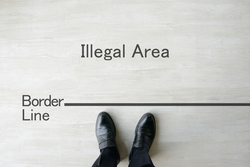
 ► Référence complète : Frison-Roche, M.-A., Prévention et sanction des Abus de Marchés, in Leçons de Droit de la Régulation bancaire et financière, Sciences po (Paris), 9 février 2022.
► Référence complète : Frison-Roche, M.-A., Prévention et sanction des Abus de Marchés, in Leçons de Droit de la Régulation bancaire et financière, Sciences po (Paris), 9 février 2022.
____
► Résumé de la leçon sur les Abus de marché : Dans une conception classique et du Droit et du "libre marché", le principe est la liberté d'action de la personne. Même si l'exercice de cette liberté, voire d'un droit subjectif peut causer un dommage, par exemple un dommage concurrentiel, c'est en quelque sorte le prix légitime d'une société libre et concurrentielle. Ainsi dans une conception libérale, seul l'abus est sanctionné, c'est-à-dire l'exercice fautif que l'on fait de sa liberté ou de son droit, allant parfois jusqu'à l'exigence d'une faute qualifiée.
Mais les secteurs bancaires et financiers ne sont pas gouvernés par le principe de libre concurrence. Ils sont gouvernés par le principe de régulation, le principe de concurrence n'y a qu'un rôle adjacent. Cela ne pourra qu'engendrer de graves difficultés lorsque le Droit de la concurrence et le Droit bancaire et financier font s'appliquer d'une façon cumulée ou confrontée sur une même situation.
Les marchés financiers sont construits sur le principe de régulation qui pose le principe de transparence et de partage d'une information exacte : c'est ainsi que l'intégrité des marchés financiers est assurée, l'Autorité des Marchés financiers en étant le gardien.
La prévention et la sanction des "abus" de marché est donc non pas une part résiduelle du Droit financier, mais un pilier de celui-ci, contrairement au Droit des marchés ordinaires concurrentiels, sur lesquels l'opacité et le non-partage des informations est la règle.
Cela explique l'état du droit des "abus de marché", dont l'effectivité de la prohibition est essentielle pour le bon fonctionnement ordinaire des marchés financiers. Leur prohibition nationale a été harmonisée par le Droit de l'Union européenne, à travers des textes dont les signes reprennent l'appellation anglaise : Market abuses (ainsi le nouveau Règlement communautaire sur les abus de marché est dit Règlement MAR (Market Abuses Regulation) et la directive qui l'accompagne MAD (Market Abuses Directive).
Il sanctionne un certain nombre de comportements, qui portent atteinte à l'intégrité des marchés,
Mais il n'exprime plus des exceptions par rapport à un principe : des fautes par rapport à des libertés ou à des droits. Il exprime des moyens par rapport à des principes dont la sanction des abus ne constitue que la concrétisation de principes dont ils sont la continuité même : l'efficacité du marché, son intégrité, sa transparence, l'information de l'investisseur.
C'est pourquoi la sanction des abus de marché ne sont pas du tout un phénomène périphérique par rapport à la Régulation des marchés financiers et à l'activité et au fonctionnement des bancaires, comme l'est le Droit pénal : elle est au contraire à la fois ordinaire et centrale. Cette différence des deux ordres publics va se retrouver dans la question lancinante de la sanction pénale et de la sanction administrative des mêmes abus de marché (par exemple "manquement d'initié" et "délit d'initié", qui ont tendance à se cumuler dans des techniques de répression qui seront l'objet de la prochaine leçon.
_____
🔎 Accéder aux slides servant de support à la leçon sur les abus de marché
🔎 Revenir aux bases avec le Dictionnaire bilingue du Droit de la Régulation et de la Compliance
🔎 Approfondir par la Bibliographie générale de Droit de la Régulation bancaire et financière
🔎 Revenir à la présentation générale du cours
🔎 Se reporter au plan général du cours
____
Utiliser les matériaux ci-dessous pour aller plus loin et pour préparer votre conférence de méthode ⤵️
June 17, 2021
Compliance: at the moment

► Compliance Law and Competition: for building, is it necessary to legislate ? Example of quasi-public interest judicial agreement: the French Competition Authority's Statement of June 3, 2021 on Facebook
The French law so-called "Sapin 2" of 2016, organized the "convention judiciaire d’intérêt public - CJIP" (Public Interest Judicial Agreement) which allows the prosecutor to undertake not to prosecute a company in returns for this company's commitments for the future. Is this mechanism reserved for this law, which only concerns corruption and bribery? The answer is often positive.
Is it so obvious?
Since the entity having the power to prosecute therefore always has the power not to prosecute. As the company always has the freedom to make commitments for the future. And everything stops.
News in Competition Law illustrate this. On June 9, 2021, as part of a transaction, the Autorité de la concurrence (French Competition Authority) sanctions Google (➡️📝 Communiqué of the Autorité de la Concurrence , translated in English by the French Competition Authority) , which has not contested the facts, for abuse of dominant position for having privileged its services in the online advertising services. Similar facts were alleged against Facebook. But on June 3, 2021, the Autorité de la concurrence (French Competition Authority) published a "communiqué de presse" (➡️📝statement translated in English by the French Competition Authority) saying that Facebook has, during the investigation, proposed commitments regarding its future behavior. It is remarkable that this statement on Facebook is published as an “acte de régulation” (regulatory act).
Yes, it is indeed an regulatory act about the future and structuring the online advertising area, internalized in this company which engages itself in its future behavior. With its statement, the Competition Authority invites the “acteurs du secteur” (actors of this sector) to make observations, for the development of what will be a sort of compliance program.
In these negotiations which are akin to a game table, where everyone calculates without knowing if they enter into a negotiation or a confrontation, the first game assuming that one shows more cards than in the second, it is indeed towards a kind of Public Interest Judicial Agreement that they are going with a Competition Authority which is both Judge and Prosecutor, concludes the agreement and, through a later decision, gives it force. Under the various legal qualifications, it is indeed the same general mechanism of Compliance Law, well beyond the specific French law known as Sapin 2.
Managed in this way, Compliance Law being an Ex Ante corpus, transforms the Competition Authority, an Ex Post Authority, into an Ex Ante Authority, openly taking "acte de régulation" (Regulatory Act), and allows it to rely on the power of companies, thus “committed”, to structure markets, which are however not regulated. Like advertising or retailing areas (➡️📝see Frison-Roche, M.-A., From Competition Law to Compliance Law: Example of French Competition Authority's decision on central purchasing body in mass distribution, 2020).
Thus Compliance Law has achieved the autonomy of Regulatory Law with regards to the notion, which nevertheless seemed intimate to it, of "sector".
April 21, 2021
Publications
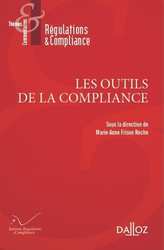
► Full Reference: M.-A. Frison-Roche, "La formation : contenu et contenant de la Compliance" ("Training: content and container of Compliance"), in M.-A. Frison-Roche (ed.), Les outils de la Compliance, coll. "Régulations & Compliance", Journal of Regulation & Compliance (JoRC) and Dalloz, 2021, pp.. 227-244.
____
📝read the article (in French)
____
🚧read the bilingual Working Paper which is the basis of this article, with additional developments, technical references and hyperlinks
____
📕read a general presentation of the book, Les outils de la Compliance, in which this article is published
____
► Summary of the article (done by the Journal of Regulation and Compliance): Firstly, as Training is a specific Compliance tool, it is supervised by Regulators. It becomes mandatory when it is contained in Compliance programs or sanction decisions. Since effectiveness and efficiency are legal requirements, what is the margin of companies to design them and how to measure the result?
Secondly, as long as each Compliance tool includes, more and more, an educational dimension, we can take each of them to identify this perspective. So even condemnations and prescriptions are so many lessons, lessons given, lessons to be followed. The question is then to know who, in this so pedagogical Compliance Law, are the "teachers"?
________
Oct. 27, 2020
Newsletter MAFR - Law, Compliance, Regulation

Full reference: Frison-Roche, M.-A., From Competition Law to Compliance Law: example of French Competition Authority decision on central purchasing body in Mass Distribution, Newsletter MAFR - Law, Compliance, Regulation, 27th of October 2020
Read by freely subscribing the other news of the Newsletter MAFR - Law, Compliance
_____
Summary of the news: Through its decision of 22nd of October 2020, the Autorité de la concurrence (French Competition Authority) accepted the commitments proposed by retail sector's firms Casino, Auchan, Metro and Schiever so that their agreement by which a common body centralizes purchases from numerous retailers, allowing each to offer these products under private label, is admissible with regard to competitive requirements.
In this particular case, the Authority had self-sized in July 2018, estimating that such a purchase center could harm competition, opening immediately a large consultation on the terms of the contract. In October 2018, the law Egalim permitted to the Authority to take temporary measures to suspend such a contract, what the Authority did from September.
The convention parties' firms committed on the one hand to update their contract limiting the power on suppliers, especially small and very small suppliers, excluding totally of the field of the contract some kind of products, especially food products and reducing the share of bought products volume dedicated to their transformation in distributor brand.
The Autorité de la concurrence accepts this proposal of commitments, congratulates itself of the protection of small suppliers operating like that and observe the similarity with the contract consisting in a purchase center between Carrefour and Tesco, which will be examined soon.
_____
We can draw three lessons of this innovating decision, which could be a model for after:
1. The technique of Compliance Law permits to the Autorité de la concurrence to find a reasonable solution for the future.
- Indeed, rather than punishing much later by a simple fine or to annihilate the performing mechanism of the purchase center, the Authority obtains contract modifications.
- The contract is structured and the obtained modifications are also structural.
- The commitments are an Ex Ante technique, imposed to operators, for the future, in an equilibrium between competition, operators and consumers protection and the efficacy of the coordination between powerful operators.
- The nomination of a monitor permits to build the future of the sector, thanks to the Ex Ante nature of Compliance Law.
2. The retail sector finally regulated by Compliance technics.
- "Distribution law" always struggle to find its place, between Competition law and Contract Law, especially because we cannot consider it as a common "sector".
- The Conseil constitutionnel (French constitutional court) refused a structural injunction power to the authority because it was contrary to business freedom and without any doubt ethics of business is not sufficient to the equilibrium of the sector.
- Through commitments given against a stop of pursuits relying on structuring contracts, it is by Compliance law that a Regulation law free of the condition of existence of a sector could leave.
3. The political nature of Compliance law in the retail sector
- As for digital space, which is not a sector, Compliance law can directly impose to actors imperatives that are strangers to them.
- In the digital space, the care for fighting against Hate and for protecting private life; here the care for small and very small suppliers.
___________
See in counterpoints the pursuit of a contentious procedure against Sony, whose the proposals of commitments, made after a public consultation, were not found satisfying.
To go further, on the question of Compliance law permitting through indirect way the rewriting by the Conseil of a structuring contract (linking a platform created by the State to centralize health data with an American firm subsidy to manage them).
June 26, 2020
Thesaurus : Doctrine
► Référence complète : J.-Ch. Roda, "Compliance et antitrust. Le discours de la méthode", in J.-Ch. Roda (dir.), Compliance et droit de la concurrence : nouveaux défis, nouveaux enjeux, Revue internationale de la compliance et de l'éthique des affaires, n° 3, juin 2020, étude 109, pp. 11-15.
____
► Résumé de l'article (fait par l'auteur) : "The discourses of the competition authorities are essential for the dissemination of the compliance culture. Their comparative analysis reveals significant divergences that may explain the differences in compliance adherence." (traduction libre : "Les discours des autorités de concurrence sont essentiels pour la diffusion d'une culture de compliance. Leur analyse comparative révèle des divergences significatives, qui peuvent expliquer les différences d'adhésion à la compliance.")
____
🦉Cet article est accessible en texte intégral pour les personnes inscrites aux enseignements de la Professeure Marie-Anne Frison-Roche
________
Nov. 6, 2019
Thesaurus : 10. Autorité de la Concurrence
Référence complète : Autorité de la concurrence et le Bundeskartellamt, Algorythms and Competition, in Autorité de la concurrence, 6 novembre 2019.
Nov. 5, 2018
Publications
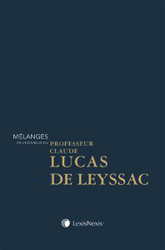
Référence générale : Frison-Roche, M.-A., Banque et concurrence, in "Mélanges en l'honneur du professeur Claude Lucas de Leyssac", LexisNexis, 2018, pp.165-180.
Résumé : Banque et concurrence ne font pas bon ménage. Ce n'est pas tant que les banques feraient figure de récidivistes à propos desquels les autorités de concurrence devraient hausser le ton par des sanctions toujours plus lourdes afin que la leçon concurrentielle soit enfin entendue. Ce sont plutôt deux ordres qui s'affrontent, deux incompréhensions face à face. En effet les banques trouvent adéquat de s'entendre pour que le système bancaire fonctionne. Plus encore, les pouvoirs publics leur demandent un comportement politique en finançant l'économie lorsque celle-ci ne s'appuie pas sur les marchés financiers, voire de lutter contre l'exclusion sociale en pratiquant « l'inclusion bancaire », bastion avancé de la conception de l'entreprise promue par le Plan très politique d'Action pour la Croissance et le Transformation des Entreprises (PACTE). dès lors, comment elles-mêmes auraient-elles un comportement de marché consistant dans un comportement égoïste et d'agression envers leur homologue ?
Si l'on plonge dans ce creuset de l'incompréhension qui engendre le heurt violent entre les banques, qui évoquent leur mission, et les autorités de concurrence, qui se prévalent de la leur, on bute sur l'écueil de la définition même de ce qu'est une banque. L'on peut estimer qu'une banque est un prestataire de services divers, agissant sur des marchés en concurrence ; le droit assure le bon fonctionnement de ceux-ci, les autorités qui gardent l’efficacité des marchés se saisissant des banques qui y exercent leurs activités. Mais si l'on choisit d'insister sur le fait que les banques sont ce qui fait fonctionner l'économie et consolident le lien social, elles sont alors partie intégrante d'un système propre : le système bancaire, lequel est un élément essentiel de la société. La concurrence n'y est plus qu'adjacente.
Dec. 21, 2017
Thesaurus : 08. Juridictions du fond
Dec. 21, 2017
Thesaurus : 07. Cours d'appel
Nov. 1, 2017
Thesaurus : Doctrine
Référence complète : Kévorkian, A., Les programmes de conformité aux règles de concurrence : La fin des réductions d'amendes ?, Cahiers de droit de l'entreprise n° 6, novembre 2017, éditorial 6.
Les étudiants de Sciences Po peuvent consulter l'article via le drive, dossier "MAFR - Régulation & Compliance"
Sept. 7, 2017
Thesaurus : 10. Autorité de la Concurrence
Référence complète: Autorité de la concurrence (French Competition Authority), Decision relating to practices implemented by the company Engie in the energy sector, Engie vs Direct Energie, 7th of September 2017, n°17-D-16